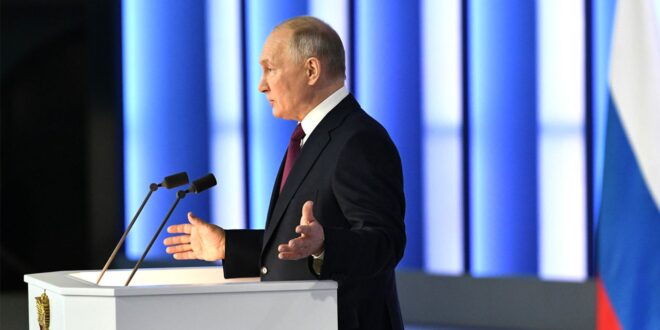President Vladimir Putin on Tuesday vowed to press onward with Russia’s war in Ukraine and railed against the West for a litany of wrongdoings in his first state-of-the-nation address since invading Ukraine one year ago.
Addressing lawmakers from both houses of parliament alongside other members of the elite, Putin relied on familiar talking points as he sought to prepare Russians for a long war, pledging to continue Russia’s offensive that started with a failed attempt to capture Kyiv and has slowed to a brutal war of attrition in eastern Ukraine.
“Step by step, we will carefully and systematically achieve [our] aims,” Putin said three days ahead of the anniversary of the start of the invasion.
The only major new announcement in the two-hour speech was that Russia would be suspending its participation in New START, the country’s only remaining nuclear arms limitation treaty with the United States.
Otherwise, Putin largely resorted to a traditional package of spending promises and accusations of betrayal and aggression directed toward the West.
In particular, he repeated past claims that it was Western countries who had started the violence in Ukraine.
“Russia did its best to solve the problem in Ukraine peacefully, but the statements of Western leaders turned out to be fraudulent and untrue,” Putin said at the Gostiny Dvor exhibition center near Red Square.
“It’s them who unleashed the war. And we’re using force to stop it,” he said to widespread applause.
“They let the genie out of the bottle [and] plunged entire regions into chaos.”
Referring to the Ukrainian theater of war as “historical Russian land,” Putin went on to claim that Western leaders were escalating the conflict by providing military aid for Kyiv and imposing economic sanctions on Moscow.
“The responsibility for fueling the Ukrainian conflict, for its escalation, for the number of victims… lies completely with Western elites,” Putin said, claiming that these elites were attempting to “inflict a strategic defeat on Russia.”
Political expert Tatiana Stanovaya said that, while Putin did not say much that was new, his phrasing was noticeably more extreme than in past speeches.
“All these old ideas are presented in a much more radicalized way,” she wrote on Telegram as Putin was speaking.
And Putin’s words prompted a dismissive response from Kyiv, which yesterday hosted the U.S. President Joe Biden on a brief visit to express his support for the country’s battle against Russia.
“They are strategically at a dead end,” Ukraine’s presidential chief of staff Andriy Yermak said on the Telegram messaging app.
“Our goal is to kick them out of Ukraine and punish them for everything.”
Addressing the issue of Western arms deliveries to Ukraine, which have included tanks, armored fighting vehicles as well as long-range missiles, Putin said that the West would trigger a response from Moscow if it supplies Kyiv with weapons that could allow them to hit targets inside Russia.
“The more long-range Western systems are delivered into Ukraine, the further we’ll have to push the threat from our borders,” he said.
On announcing the suspension of Russia’s participation in New START, which caps the number of nuclear warheads held by the U.S. and Russia, Putin warned that Russia’s nuclear forces should be ready if the U.S. began nuclear tests.
“No one should be under the illusion that global strategic parity can be violated,” he said.
Putin was speaking to Russia’s Federal Assembly, which is composed of State Duma deputies, members of the Federation Council and other officials. This year it also included soldiers who had taken part in the war in Ukraine.
But there were some noticeable absences — with independent Russian media reporting that there was no sign of Moscow Mayor Sergei Sobyanin, Chechen leader Ramzan Kadyrov or Russia’s top two military commanders in Ukraine, Valery Gerasimov and Sergei Surovikin, in the audience.
Amid the fighting in Ukraine, the Kremlin canceled Putin’s state-of-the-nation speech last year — just like it canceled Putin’s other set piece political events, including his annual press conference and televised Q&A session.
Putin’s last state-of-the-nation speech was in April 2021.
Hardliners in Moscow will likely be satisfied that the war will continue, a former senior Kremlin official told The Moscow Times, although he was dissatisfied with the lack of specifics in the speech.
“For example, how far will we move the frontline after new arms deliveries to Ukraine? Or how will we respond to the current deliveries?” he said.
Alongside attacks on Western countries, Putin also praised the performance of Russia’s economy amid sanctions and the strains of wartime.
He reiterated his claim that Western sanctions “haven’t achieved anything” and said the Russian economy had shown resilience.
“Russia is actually entering a new cycle of economic development,” he claimed. “There’s every opportunity for a breakthrough in many areas.”
And, while Putin criticized the hundreds of thousands of Russians who are estimated to have fled the country since the start of the invasion as “traitors,” he said the authorities won’t “engage in a witch hunt.”
According to Russian political analyst Alexander Kynev, the fact that Putin did not make any groundbreaking announcements should be taken as a positive sign that no major new escalation in Ukraine is imminent.
“The absence of news is good news,” Kynev wrote.
His views were echoed by a top government official who spoke to The Moscow Times.
“Fortunately, there was nothing special. Everything was quiet, clear and calm,” said the official, requesting anonymity to speak freely.
At the same time, pro-Kremlin expert Sergei Markov said the speech was meant to convey to Russians that they should come to terms with their new reality.
“Putin gave an answer to the main question in the minds of Russian citizens: When will this so-called ‘special military operation’ end? The answer is in the whole speech,” Markov wrote on Telegram.
“It’s not over yet. All of this is for the long haul. This is our new life. Learn to live in it.”
 Eurasia Press & News
Eurasia Press & News




